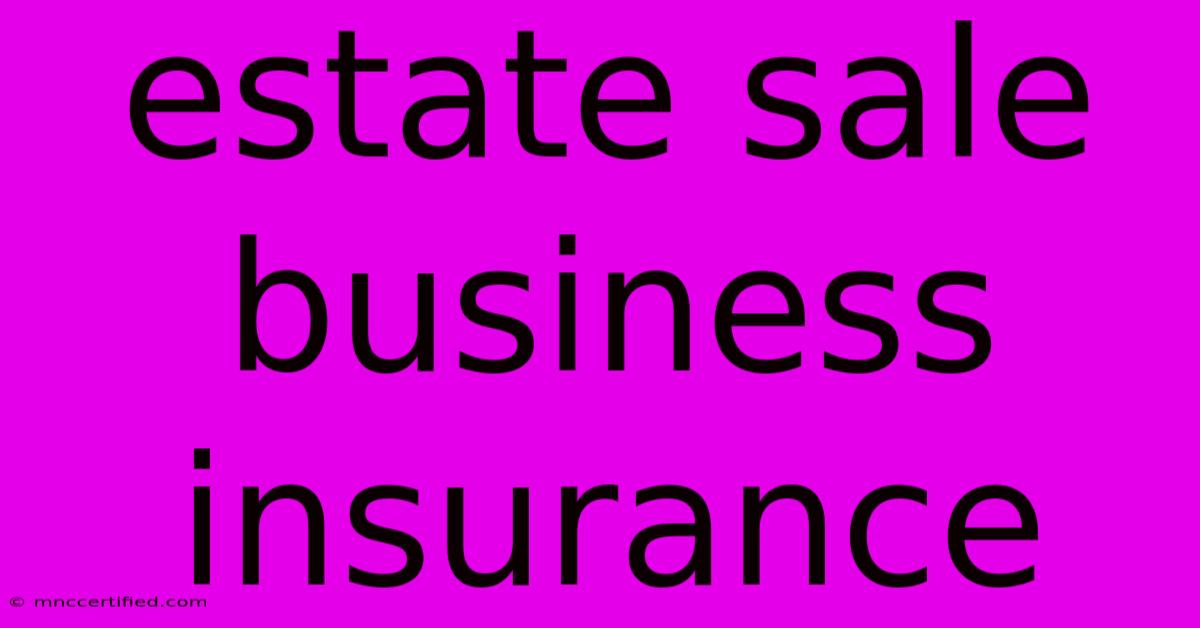Estate Sale Business Insurance

Table of Contents
Estate Sale Business Insurance: Protecting Your Investments and Clients
Starting an estate sale business can be incredibly rewarding, but it also carries significant risks. From handling valuable items to navigating the complexities of client contracts, protecting your business with the right insurance is crucial. This comprehensive guide will explore the essential insurance policies every estate sale business needs.
Understanding Your Risks: Why Insurance is Non-Negotiable
Estate sale businesses face a unique set of risks. These include:
- Damage or Loss of Property: You're responsible for handling potentially valuable and fragile items. Accidents happen – a dropped vase, a damaged painting, or even theft can lead to significant financial losses.
- Liability to Clients: Clients entrust you with their possessions. If something goes wrong – be it damage, theft, or inaccurate inventory – you could face costly lawsuits.
- Employee Injuries: If you employ others, you're responsible for their well-being. Workers' compensation insurance protects you from liability in case of workplace accidents.
- Professional Errors: Mistakes in appraisals, advertising, or handling of the sale can have serious consequences for your clients and your business reputation.
- Business Property Damage: Your storage unit, van, or even your home office could be damaged or destroyed.
Ignoring these risks could jeopardize your business and your personal finances. The right insurance coverage provides a financial safety net, protecting your investment and ensuring peace of mind.
Essential Insurance Policies for Your Estate Sale Business
Here's a breakdown of the key insurance policies you should consider:
1. General Liability Insurance: A Must-Have
This is arguably the most important policy for your estate sale business. General liability insurance protects you against financial losses resulting from bodily injury or property damage caused by your business operations. This includes claims from clients or members of the public who are injured on your property or as a result of your actions.
2. Inland Marine Insurance: Protecting Your Cargo
Inland marine insurance specifically covers property in transit. This is vital for estate sale businesses, as you frequently transport valuable items between locations. It protects against loss or damage during transport, providing crucial coverage beyond standard liability insurance.
3. Workers' Compensation Insurance (If Applicable): Protecting Your Employees
If you hire employees, workers' compensation insurance is legally mandated in most states. This policy covers medical expenses and lost wages for employees injured on the job, protecting you from potentially crippling lawsuits.
4. Commercial Property Insurance: Safeguarding Your Business Assets
If you own or rent a space for your business operations (office, storage unit), you'll need commercial property insurance. This covers damage or loss to your physical property due to fire, theft, vandalism, or other covered perils.
5. Business Owners Policy (BOP): Bundling for Convenience
A Business Owners Policy (BOP) combines several coverages into a single package, often including general liability, commercial property insurance, and potentially other important coverages. This simplifies your insurance needs and can offer cost savings.
Choosing the Right Coverage: Factors to Consider
The amount of coverage you need will depend on factors such as:
- Value of the items you handle: Higher-value items require higher coverage limits.
- Number of employees: More employees necessitate greater workers' compensation coverage.
- Location of your business: Risks can vary based on geographic location.
- Type of operations: The complexity of your operations influences the level of insurance needed.
Finding the Right Insurance Provider: A Step-by-Step Guide
- Research different insurance providers: Compare quotes and coverage options from multiple companies.
- Consult with an insurance broker: A broker can help you understand your needs and find the best policies for your specific circumstances.
- Review policy details carefully: Understand the coverage limits, exclusions, and deductibles before signing up.
- Ensure adequate coverage: Don't skimp on coverage – underinsurance can leave you vulnerable to significant financial losses.
Protecting your estate sale business through comprehensive insurance is not just about safeguarding your assets; it’s about maintaining the trust of your clients and ensuring the long-term success of your venture. By investing in the right insurance policies, you're taking a vital step towards building a stable and prosperous business.

Thank you for visiting our website wich cover about Estate Sale Business Insurance. We hope the information provided has been useful to you. Feel free to contact us if you have any questions or need further assistance. See you next time and dont miss to bookmark.
Featured Posts
-
Franklin Life Insurance Policy
Nov 27, 2024
-
Does Car Insurance Cover Arson
Nov 27, 2024
-
Barcelonas Brest Blow Key Injury
Nov 27, 2024
-
Sporting Cp Vs Arsenal Live Score Updates
Nov 27, 2024
-
United Security Auto Insurance
Nov 27, 2024